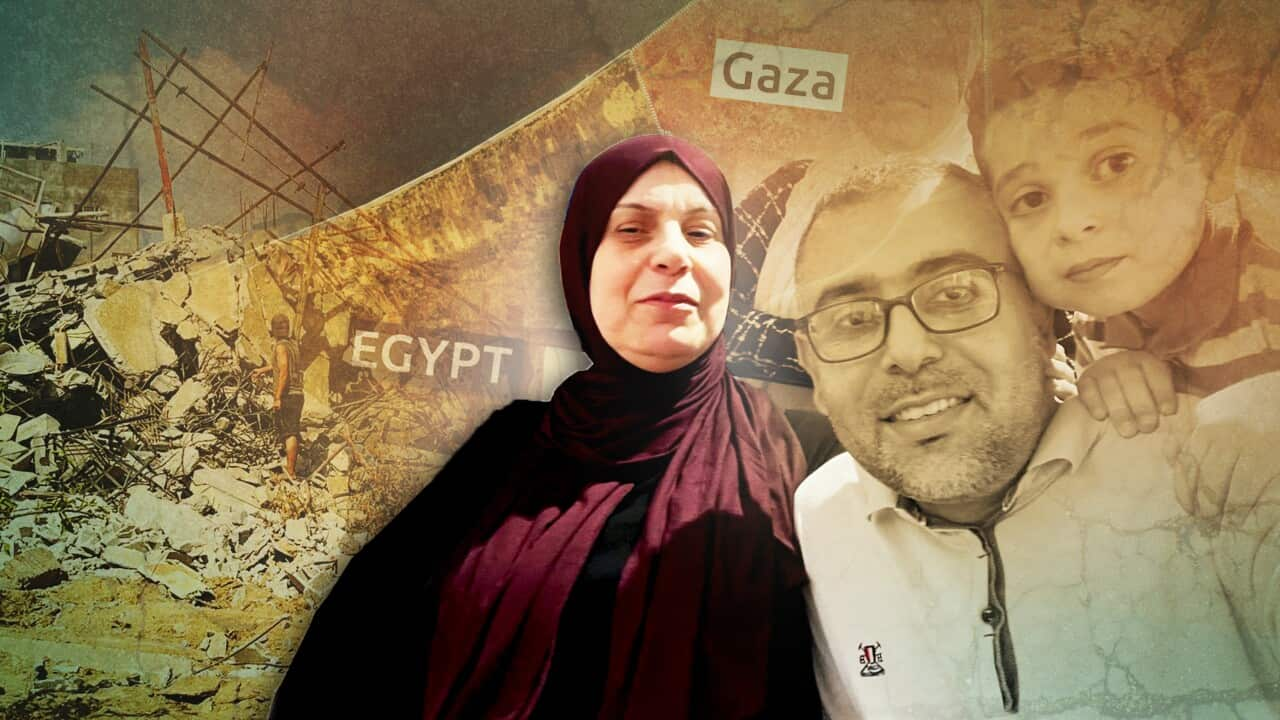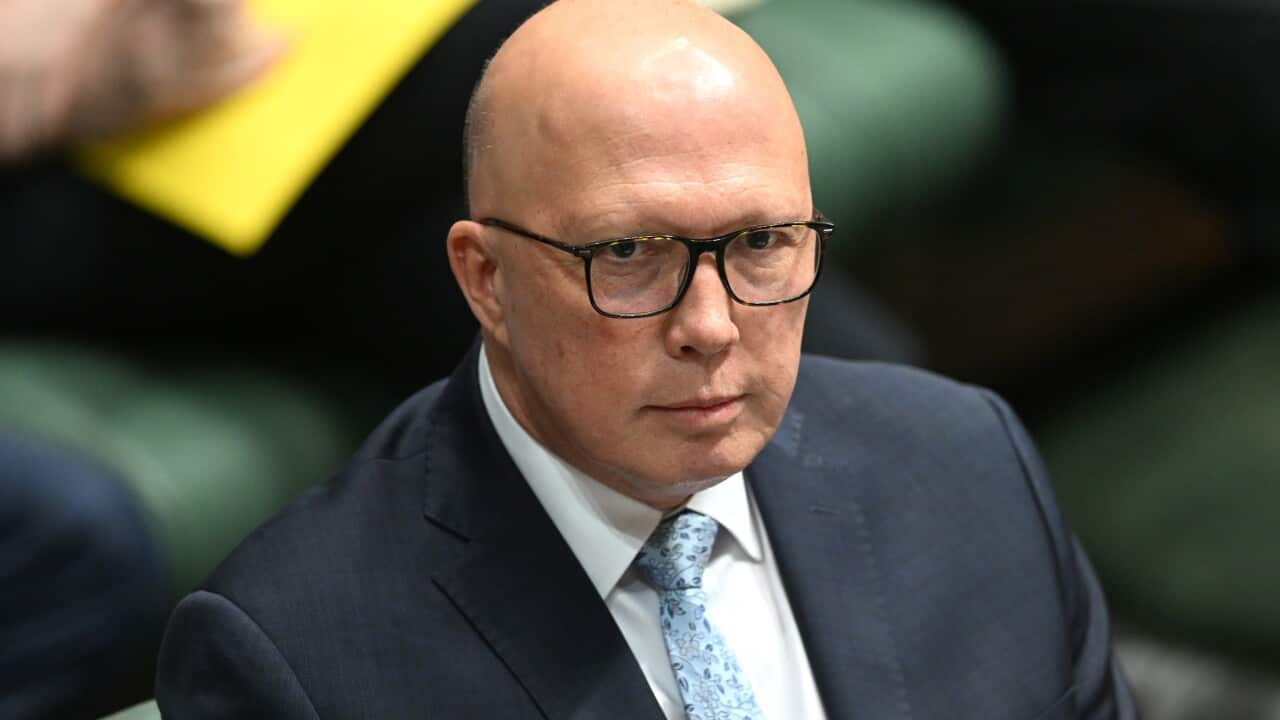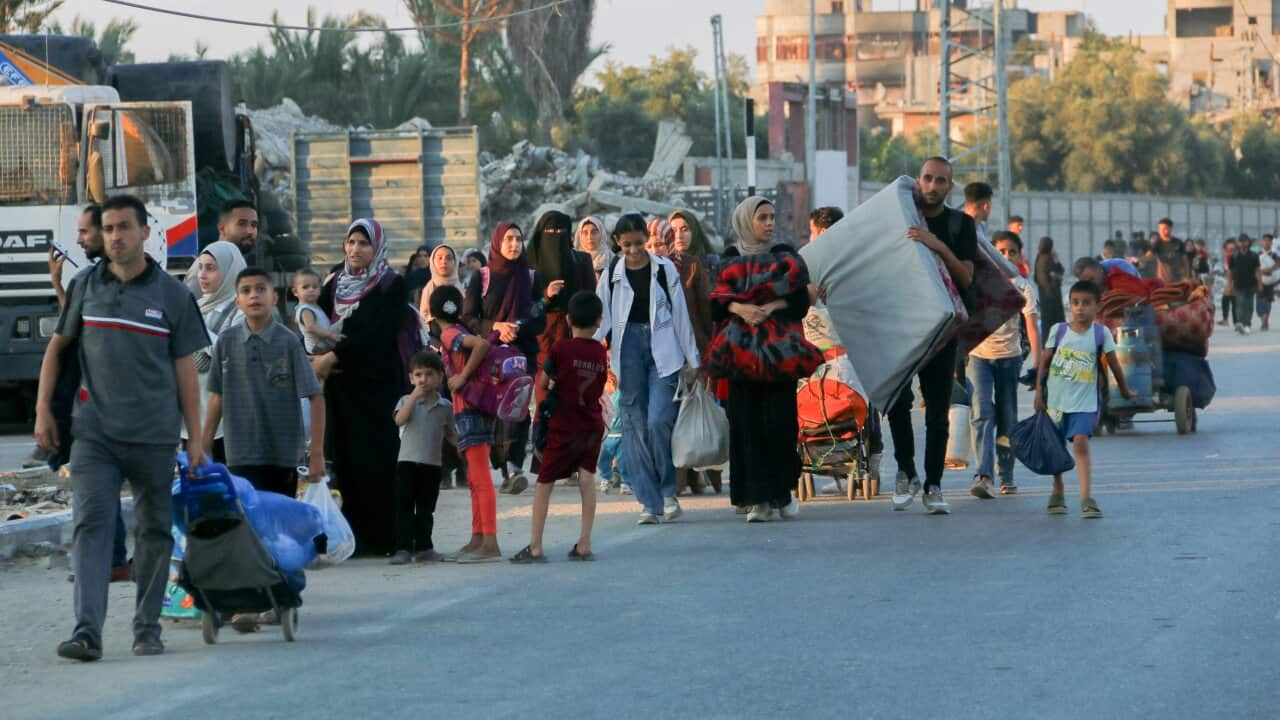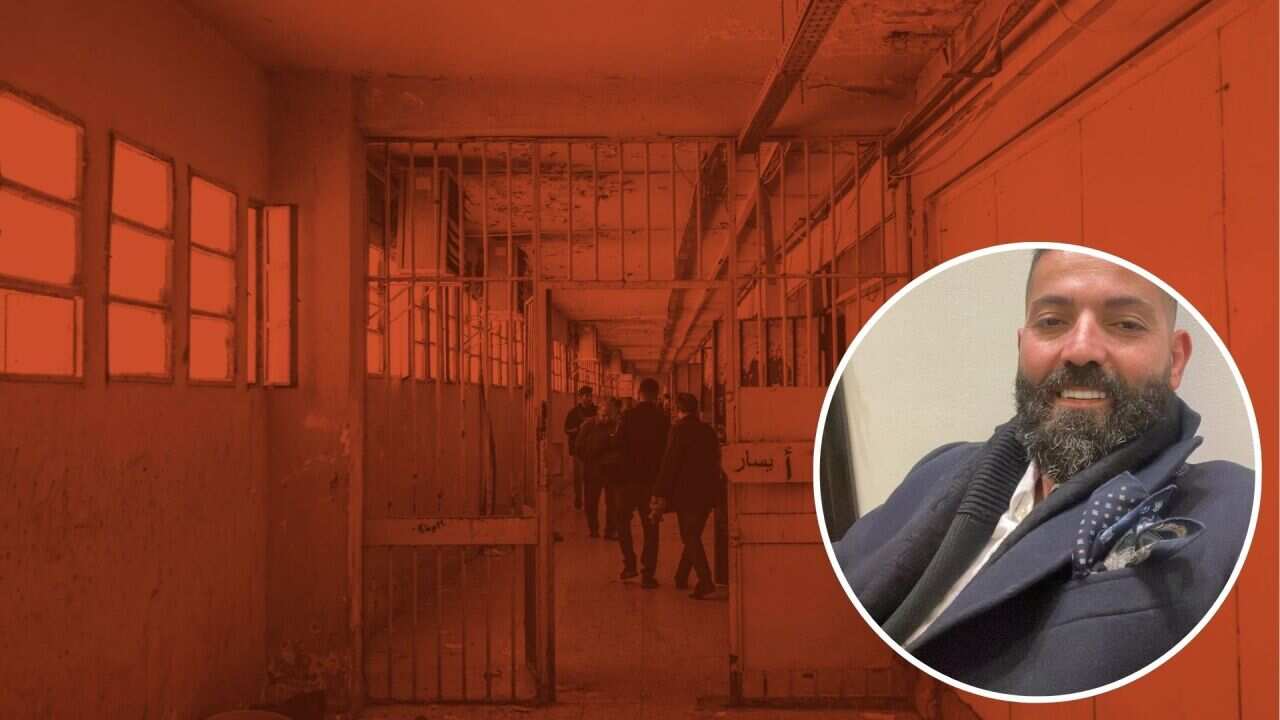Key Points
- Desperate to escape the war, Palestinians pay a private company US$5,000 per person to leave Gaza.
- Sawsan El-Sakka and two of her children fled to safety in Australia, but other members of her family remain in Gaza.
- The Australian government has granted 2,686 Palestinians visitor visas since 7 October 2023, but only 1,010 Palestinians have arrived in Australia.
Before the start of the war in Gaza, the El Sakka family’s life was far from comfortable, but it was “stable”.
“We didn’t have everything we needed, but things were fine,” Sawsan El-Sakka, 63, who lived in the al Qararah region, explained.
“My husband was a teacher, and my son was an employee at the ministry of finance.”
But everything changed after Hamas' on Israel, in which more than 1,200 people were killed and over 200 hostages taken, according to the Israeli government.
Almost 40,000 Palestinians have been killed in Israel's counteroffensive in Gaza, according to the health ministry in Gaza.
The 7 October attack was a significant escalation in the long-standing conflict between Israel and Hamas.

Sawsan El-Sakka's granddaughter. Credit: Supplied
The family’s situation only got worse when they were ordered to evacuate, eventually finding sanctuary with a relative outside Rafah, before moving in with a friend.
"The kids were so scared by the bombing,” El-Sakka, who has three children and six grandchildren, said.
She said her family had no choice but to find sanctuary in a tent refuge, braving scorching heat that made life "so difficult".
“We slept on the ground and getting any of our basic needs was so difficult. The food was so expensive. Even making breakfast was a struggle.”

The El-Sakka family spent time in a tent camp. Credit: Supplied
“When my husband saw how I was struggling, he told me to leave with two of our children and assured me that the rest of the family would catch up with us later.”
According to El-Sakka, what prevented the whole family from leaving together was the money it was to take to leave Gaza.
Rising ‘coordination’ fees
SBS Arabic24 understands that the only people allowed to travel to Egypt through the Rafah crossing are foreign nationals and injured evacuees.
But recently, an increasing number of Palestinians have escaped the war using the services of an Egyptian company called Hala Tourism.
A process of “coordination” takes place, El-Sakka explained, which involves a family representative providing cash payment at Hala’s office in Egypt's capital city, Cairo.
“Around 20 days or so after payment, the names of those who paid appear on the list of people allowed to leave through the Rafah crossing.
“The list of the names and dates is usually published online,” she said.
A relative in Cairo helped El-Sakka complete the process.
“My niece went to the company’s office in Cairo, registered our names, and paid $15,000 for me and my son and daughter.
“Unfortunately, we didn’t have enough money to pay for the rest of the family. My brother had to pay $45,000 to get his whole family out.”
The family eventually crossed the border by car.

The El-Sakka family's house was destroyed by the Israeli army. Credit: Supplied
On its Facebook page, Hala describes itself as “a company that provides travel and tourism services and passenger transportation services (VIP) to the Rafah land crossing using the best methods and the latest means of transportation at the highest levels of service”.
Hala's main office is located at the heavily guarded headquarters of its parent company, the Organi Group, in Nasr City district.
The Organi Group belongs to Egyptian tycoon Ibrahim Al-Arjani, who according to , is board chairman of several private businesses, including Misr Sinai Company for Industrial Development and Investment.
He is also head of the Sinai Tribals’ Union, which acted as the government’s arm in its fight against IS in Sinai.
The reported in June on the accusations that Al-Arjani charges Palestinians a hefty fee to flee Gaza, describing how he “maintains close connections to top Egyptian officials”.
The “coordination" fee has reportedly changed several times.
A commentator wrote on Hala’s Facebook page: “Why do we have to pay this amount of money? The fee used to be $1200, but after we had collected the money, they raised it to $5000. It’s unfair. We’re dying here but no one cares for us…”
SBS Arabic24 tried to contact Hala using the phone numbers on their Facebook page, but was unsuccessful.

Sawsan El-Sakka's husband and grandchildren in their house before 7 October, 2023. Credit: Supplied
It comes amid comments by Australia's opposition leader Peter Dutton against granting Palestinians fleeing Gaza visas to enter Australia.
"I don't think people should be coming in from that war zone at all at the moment. It's not prudent to do so and I think it puts our national security at risk," he said.
Government Services Minister Bill Shorten expressed his disappointment with Dutton’s statements.
“All reasonable people know that not all people in Gaza are members of Hamas. We know there's a lot of innocent people caught up in a war, not of their making,” he told SBS News.
Asked about the border crossing fees, Shorten said he did not have enough information about the charging policies at the Egyptian border.
“I know that the Australian government is extending all consular assistance to Australians or people with visas entitled to Australian assistance. It is a dreadful situation.”
‘We live in limbo’
Although El-Sakka and her son and daughter arrived in Australia safely in March, she said she feels “torn”.
“I live in agony, and I can’t even return if I want to because the Rafah crossing is closed. We plead with the officials for help,” El-Sakka said.
She said she felt sad and confused because the visa application of her eldest son was rejected.
“He’s a first-degree relative. His application was supposed to be accepted.
“All the recent visa applications got rejected."
According to , the Australian government has granted 2,686 Palestinians visitor visas since 7 October, but only 1,010 Palestinians have arrived in Australia.
In addition, 4,614 Palestinians have been denied temporary protection from the war since their visitor visas were rejected during the same period.
“We hope that we’ll be treated like Syrians and Ukrainians, and we’ll be treated as refugees,” El-Sakka said.
We live in limbo. We don’t know if we’ll be granted refugee status. Our life is very unstable.Sawsan El-Sakka
El-Sakka said she tries to maintain contact with the rest of the family, but this proves to be hard sometimes because of the destruction of the infrastructure in Gaza.
“When they have access to the internet, we get to talk.
“Our house and our son’s house have been destroyed. Nothing is left. Now they live in a tent.”
And despite her longing to hear their voices, El-Sakka said she fears the sound of the phone.
“I cannot sleep at night. When my phone rings, I’m too scared to answer,” she explained.
Despite the hardship, El-Sakka said she remains hopeful.
“I want to tell my family in Gaza to be patient and that I’m hopeful that we’ll be reunited one day.
“We are so tired. We want the war to stop.”








